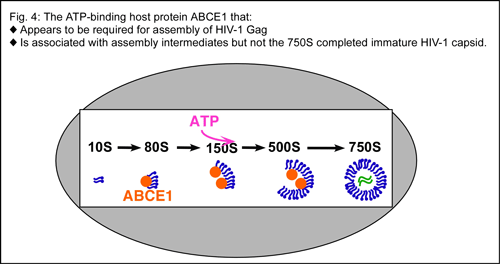| |||||||
|
|
The Host Protein ABCE1 (HP68) appears to be required for HIV Capsid Assembly: In the HIV capsid assembly cell-free system, Gag is the only viral protein present, but a large number of cellular proteins are contributed by the cellular extract. Since Gag does not bind ATP or GTP, the finding that energy is required post-translationally suggested that a cellular ATP-binding protein facilitates an energy-dependent step in capsid assembly. This finding, which was unexpected given the accepted notion that capsids formed via "self assembly", led to a search for ATP binding proteins that also bind to Gag and promote HIV capsid assembly in cells. Using the cell-free HIV capsid assembly system, Jaisri Lingappa along with colleagues from UCSF and members of her new laboratory at the University of Washington, demonstrated that the cellular protein ABCE1 (formerly called HP68 for host protein of 68 kD; also called RNase L inhibitor or RLI by Bisbal et al., 1995) is associated with HIV Gag in assembly intermediates but not in the completed HIV virion. Moreover, depletion-reconstitution studies in the cell-free system and dominant negative mutant studies using mammalian cell lines indicate that ABCE1 is likely required for HIV capsid formation (Zimmerman et al. 2002). Our current model is that ABCE1 acts in conjunction with other cellular proteins present in assembly intermediates to facilitate immature HIV capsid formation (Fig. 4).
|


